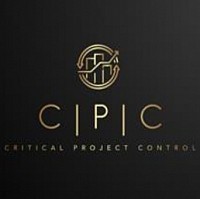Our core business...

... when it comes to Project Controls, Effective Management and Decision-Making, our services will add value to your operations
... what we do.
- Develop and Provide time based Project Controls for Dynamic Planning & Programming, as well as, Project Controls for Risk Analysis & Earned Value Analysis;
- Prepare Management Discussion Reports, and/or Claims, and/or Response to submitted Claims, on cases where the Parties to an Agreement are working to hopefully avoid the ‘crystallisation’ of a potential contractual dispute(s), on matters concerning Critical Delay Events which cause Extensions of Time on the executed Contract, or Business Interruption Insurance cover where delay and/or disruptive events trigger Notifiable Events which may be considered under; Notifiable Diseases or Non-Damage Denial of Access or Loss of Attraction clauses in the policy agreement. Put simply, the assessment of delays, disruptions and interruptions, in accordance with Business Interruption Policies, and/or, Construction and Engineering Contracts.
- Delay and Disruption Expert Witness Services: The work involves providing Technical Expert support on matters concerning Extension of Time issues, wherein, the Parties to the Contract intend to refer the matters to; the Mediation process or the Alternative Dispute Resolution (ADR) process or the Litigation process, for resolution.
- Training - specifically on Project Controls for the general management of Time and Risk during the delivery of a project, as well as, methods for assessing and demonstrating the impact of delay/disruptive/Interruptive events that prevented the parties to the executed agreement from achieving regular progress, and thereafter, failing to complete the Project or Business activities on time.
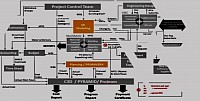
Our comprehensive expertise in controlling and tracking projects drives overall performance and predictability.
... how we manage Project Controls on complex dynamic projects
Traditionally, the phrase 'Project Controls' has been used to define the quantitate measure for costs, scheduling and risk during the project execution phase. This view is no longer persuasive in industry because it’s limited. At Critical Project Control Limited, we extend the use of said phrase further when we incorporate and communicate all pertinent information, that will be generated throughout the life of a project, into formats that facilitate effective tools for management and decisions making on: Cost, Scope, Time, Risk and the Administration of the Contract.
By way of an example, whilst developing the Mater Programme on complex projects, we adopt a strategy where we integrate requirements for managing time for all Key Disciplines on a project into one comprehensive document, and to achieve this, we strategically rely on the Master Programme as the main tool for managing Time and Risk. To this extent, the Master Programme is developed by incorporating/integrating the competing needs of the various disciplines into one dynamic document. On complex projects, the individual and specific programmes for managing all major disciplines, such as - Legal Advice; Project Finance; Cost Estimation; Engineering Designs; Procurement; Manufacture; on-site activities for Construction or Installation; and finally, Maintenance and Facility Management, all typically have unique sets of activities, resources, schedules of risks, defined dependencies and deliverables, hence, they all typically operate from ideal positions. As such, it stands to good reason that; The primary function of a fully integrated Master Programme should combine information from all major ‘Stand-alone’ programmes and risk schedules into one dynamic document, wherein, the outputs from the Master Programme can crucially be used by the Project Team as the main tool for making decisions on monitoring performance on time, scope, risk and cost forecast on a project.
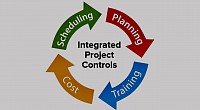
... data gathering, data management and analytical processes used to predict, understand and constructively influence the time and cost outcomes of a project
... how we develop Project Controls for dynamic Master Programmes
At C|P|C, we use first principles quantitative methods to plan and develop programmes form the Scope of Work as defined on key project documents such as the Bill of Quantities (BoQ), Contract Data, Specifications, photographs, and the core body of the Agreement/Contract. This approach relies on methods as developed through Management Science/Operations Research (MS/OR), which include the following;
- Describing and Identifying the Work Break-down Structure (WBS) and Schedule of Activities (SoA) - by using information based on; Rates of Production for a particular Resource; Itemised Quantities contained within the BoQ or Contract Data; Project Schematics/Drawings/Isometrics; Desk-top studies, terms and conditions of the Contract etc, it is possible to; (1) identify the level of detail, work-steps and logical sequence for activities that are required to effectively manage time, (2) calculate durations of scheduled activity and allowances for risk, (3) identify and show key milestone, constraints and interfaces of dependencies.
- PERT (Programme Evaluation and Review Technique) - PERT method converts static information into useful dynamic information by introducing logical to; relationships, constraints, calendars, durations and sequences, for scheduled activities shown on the Master Programme. The use of the PERT technique allows the programme to function as a dynamic document which can be used for monitoring and managing criticality, as well as, overall performance of project operations based on the impact of actual recorded progress or delay and risk events.
- Critical Path Method (CPM) - allows the programme to dynamically monitor critical and non-critical project activities. CPM relies on monitoring the discernible dynamic critical path that runs through a network of logically linked activities. The critical path is dynamic in nature and may change after each update to the programme. Additionally, this path contains zero float, hence, the contractually accepted date for completion will slip, if regular progress is not achieved for any activity on the critical path.
- Programme Network and Optimisation - involves adopting the best planning practice for: linear processes; overlapping or concurrent processes; logical determination as defined by the conditions of contract; simulations of Resource usage, activity sequencing or variations within multiple working calendars;
- Earned Value Analysis Techniques - Earned Value Analysis (EVA) is a method that allows the Project to measure the amount of work actually performed on a project beyond the basic review of cost and schedule reports. EVA provides a method that permits the project to be measured by actual progress achieved. The project manager is then able, using the Periodic Physical Progress measured, to Periodic Cash Flow Forecast i.e. forecast a project’s total cost and date of completion, based on trend analysis or application of the project’s budgeted “burn rate” Vs actual.
NB: What has Management Science and Operational Research done for time management and risk analysis, lately?
Most readily available Project Management softwares that are regularly used in industry to produce and run Master Programmes and Risk Schedules incorporate MS/OR quantitative methods. Software such Asta Power Project, Primavera P6, CS Project, Microsoft Project, Monte Carlo, LogicGate, ERM and Pertmaster, creat dynamic models and simulations for time and risk related events based on MS/OR quantitative methods.
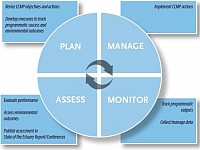
..measurements of progress based on actual physical percentages enables the assessment of performance
...how we track progress on projects
- For the purpose of reporting, it is good practice to use the Master Schedule, as the vehicle for communicating recorded progress from all Disciplines on the projects i.e. progress update information as recorded and contained within sub-programmes for; Legal, Finance, Design, Procurement, Logistics, Demolition, Construction / Installation etc, should be transferred into the Master Programm for analysis and reporting;
- When reporting on measured progress and updates, we put emphasis on the gains or loss of time as it pertains to; Critical Path items; Project Interface Items; and Key Contractual Milestones;
- Keep track of actual project progress and expenditures, relative to budgeted figures for time and costs;
- Keep track of Change Control Events by comparing the latest schedule of events, with the Baseline.

... introduce new and improve existing set of policies, tools and procedures to enable the recovery of both time and cost
...how we help troubled projects turn things around
For project troubled by impediments affecting regular progress, we at Critical Project Control suggest solutions based on the "3 P's."
- #1. "Problems"
Identify what has gone wrong and how it can be fixed, so as to help the Project Team(s) recover lost ground whilst work to complete the project continues with no unnecessary additional delays. Typically, the kind of events that affect regular progress or the timely performance of operations may be identified as excusable or non-excusable events. Furthermore, the timing when said events occur will determine both; the description of the event i.e. sequential event or concurrent event, and the methodology for assessing the impact of each event. Thus, by Identifying and Describing events in these basic terms, we can fashion the Leadership on the Project with vital information for effective management and decisions. A a strategy and plan for solving the problem can then be drawn for the wider Project Team implement.
- #2. "Plan"
Going forward, the recovery plan must optimise corrective measures based on the new strategy. This will include the development of a new Optimised Master Recovery Programme. This new programme will incorporates and form part of the new regime on the project, wherein, ‘Stake Holders’ deliverables; Risk Events; Critical Delays Events (including Prolongation Loss and Expense Costs); and all new measures/step to perform the balance of work to completion, are clearly identified and monitored on a regular basis. The new programme/plan should provide suitable levels of accuracy and improved models for making predictions.
- #3. "Progress"
Monitor what materially has being achieved against the new agreed bench-mark, and where necessary, additional modifications to the new plan should be adopted, in oder to; improve performance, prevent and mitigate impacts of
new risk events.
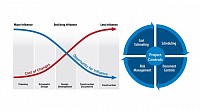
... no project is without Risk, thus their must be a conscious effort by the Project to; Identify, Analyse and Managed the impact from all likely Events.
... how we develop and provide Project Controls for analysing Risk and Earned Value.
- Risk Analysis
At Critical Project Control, we believe that, an effective exercise for analysing Risk Events should be established and maintained throughout all key Stages of a project. That is to say, Risk Assessment exercises - wherein the Risks are Identified, Defined, Described and Categorised, should form part of the Strategy, Planning, and Implementation / Execution, of a project.
- Earned Value Technique
Basically, this is an important approach for providing accurate forecasts of project performance, that is based on calculating variance between budgeted values and actual values for Time and Itemised Costs.
- Power of Synergy – How the Master Programme (MP) and Risk Event Chain Work Together.
Step 1.
- The Project Team develops the work breakdown Structure (WBS) and lays out the project plan for managing Risk Events associated with planned Scheduled Activities, planned Resources and Costs.
- Project team ensures EVM accounting is put in place, and that, the MP can be used to measure performance, cash flow forecast and both risk events.
Step 2.
- The Project Teams/Disciplines use the information contained in the Programme to introduce risk elements to Scheduled Activities, or Cost-Load Items, or Resources-Loaded Items.
- Identifies negative triggering events and the associated impact.
- All teams consider response events to mitigate or avoid risk effects.
Step 3.
- All Teams/Disciplines work together to develop an Event Chain structure(s).
- Project Risk Team and Planners incorporates pertinent Events Chain information into the MP.
- New plan with incorporated Event Chains is 'run' to assess the impact on the MP.
Step 4.
Project Team continues to monitor and manage Events Chain by;
- Implementing responses and actions against events as necessary, or
- modifying the status of Risk Events as issues unfold, and
- ensuring all Chain Events associated with completed Activities are documented safely.
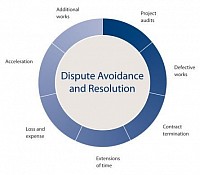
...essentially, for a dispute to exist, a Claim must have been made, and that, said Claim is not admitted.
... how we prepare Claims or response to Claims, on matters concerning Extensions of Time, in a contractual dispute.
For a significant number of projects, delay and disruptive events of the critical kind will cause the key date(s) for; commencement to be deferred, or completion to be prolonged. Hence, we at Critical Project Control help our Clients, who are party to a contractual dispute address the question on how confident they can be with their arguments on where the responsibilities possibly lie for said events or the amount of calculated delay, disruption and prolongation said events have critically caused. Based on our expertise and abilities, we typically produce and issue an expert report, wherein, we define / describe, assess, demonstrate and inform on our conclusions about the nature and level of impact, said events may have had on regular progress for any given Project, and/or, business operations where the issues concern Business Interruption damage assessment.
At C|P|C, we consider the preparation of Delay and Disruption Expert Reports to be concerned with establishing the overall effect and impact of identified events that prevented (or continue to prevent) the execution of project or business operations, in accordance with, the the provisions of the executed Agreement(s).
We understand that, by identifying and defining events that may have disturbed, interfered, interrupted, impeded, disrupted or prevented the performance of the project, it is possible to analytically determine and demonstrate the deleterious effects of said events, by comparing and contrasting; primarily, the baseline plan activity durations with the actual durations for executing the same activity. Secondarily, we rely on all pertinent and contemporaneous project records to identify, describe and develop the timeline for all potential critical delay events. Thirdly, we update the baseline programme with recorded progress prior to impacting said programme with all critical delay events, at the time each event occurred. Fundamentally, for Project that have incurred critical delay in their execution, we rely on multiple techniques to determine the sequence, timing, criticality, and impact of all delay events on the accepted baseline programme.
Incidentally, the well published legal issues that befell the late delivery of the new Wembley Stadium, in London, reflects what seems to be a fact of life; which is, a significant amount of court cases that are arbitrated or litigated in the construction industry, concerned the resolution of events that critically delayed or disrupted the project beyond the contractual date for completion. According to Constructing Excellence - the body that collects key performance data from the UK construction industry, there has been little year-on-year improvement to the number of construction or infrastructure projects that finished on time, and that, about 40% of projects finish later than planned. Therefore, based on these statistics, we at Critical Project Control Limited always advise all Our Clients about the importantance of making sure the project maintains a robust ‘Fit-for-purpose’ Master Programme and good project records, as it may be required for the resolution of time related issues that are in dispute.

A competent and experienced Expert Witness has the ability to significantly impact the outcome of any case.
... Expert Witness Services
The Expertise at C|P|C has successfully allowed us to undertaken a broad range of expert related commissions. These commissions have been carried out in most continent of the world, and extend across the complete spectrum of construction, infrastructure and engineering projects.
At C|P|C we bring the experience and skills that allow us to work with other highly experienced Experts in Construction; Engineering ; and the Legal Professional.
Whether you are seeking expert analysis, reporting or testimony for your next case, or whether the need is limited to specialised consultation, at Critical Project Control we believe choosing the right Expert Witness or Specialist is the first step to adding value to your operations.
Our Expert and Specialist track record is very extensive; below is a sample selection of the expert / specialist appointments.
Examples of our Experience:
- Delay & Disruption Expert: Act as the Delay & Disruption Expert Advisor on an Oil and Gas Condensate field development project located in the northwest region of Kazakhstan
- Appointed as Single Delay and Disruption Expert Witness, on matters in dispute to construct a facility for the 2012 Olympics in the UK.
- Expert Advisor appointed to Audit and prepare a Recovery Baseline for a material processing plant in Finland.
- Assist the Delay and Disruption Expert Witness in an ICC Arbitration, where the disputed issues concerned events that critically delayed the construction of 2 Exploration Ships in India.
... how we develop and provide training for Project Controls which influence the management of Time on projects
We at C|P|C have gained valuable experience and skills working with various forms of contracts that include (but are not limited to) the following; MF/1, ICE 6th Edition, IChemE, FIDIC (Red and Green Books), GC/Works/1(Edition 3), ICC(NR12), Other bespoke engineering contracts, and the entire suite of JCT & NEC contracts.
As such, we are able to supplement the service we provide to our Clients by developing targeted training sessions which highlight the role of Time Management, for projects being performed under the above-mentioned forms of engineering and construction
contracts.
